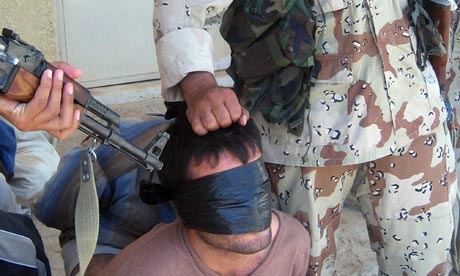Iraq war logs: These crimes were not secret, they were tolerated
Why did we not investigate allegations of murder and torture in Iraq at the time, when it was well known what was going on?

The most shocking of the revelations in the current batch of leaked Iraq war logs is that most of the acts of torture and murder were committed in the open.
They weren't secret. They were tolerated, sanitised – justified, even. Take the Wolf Brigade, the 2nd battalion of the interior ministry's special commandos.
Everybody knew about them. You would see them in their pick-up trucks wearing balaclavas. When there was a sectarian murder people would talk about the wolves, until they became a shorthand to describe a certain kind of cruel violence. The wolf commandos became killers in the uniform of the Iraqi police.
In 2005 an Iraqi government official confirmed a list of places where she believed torture and murder were taking place. A British police mentor described entering the office of a notorious figure at the interior ministry and found a man with a bag over his head standing in the corner of the office.
Some of us who covered Iraq wrote about what we found. In summer 2005, I described the operation of the torture squads. Human rights organisations prepared their own reports. But nothing very much happened, except excuses.
Like the looting that occurred in the aftermath of the fall of Iraq, it was "understood." The victims probably deserved it, was the unspoken intimation. Officials, British and American, were really not that bothered.
Later, when it was men in police uniforms who were doing the killing, reported in the Iraqi papers day after day, the official line was "anyone could buy a uniform" or that these were difficult times and there would be "bad apples".
But they weren't bad apples. I spoke to people who had been taken to the interior ministry and heard the screams.
One day a DVD was brought to me of a former interview subject who had been tortured to death after being taken by men in uniform. Like others, I wrote up what I knew. But nothing much ever happened.
It's true that when things sometimes became too embarrassing – too obvious – a local police chief implicated in killings might be removed or officials at the ministry re-organised. But the murder continued. There was a new excuse: the police had been infiltrated by Shia extremists. Which was true, up to a point. Except it wasn't really infiltration, more of an alliance in many places: a coincidence of sectarian interest.
Sometimes I would come across soldiers who would intervene. One day, at the Ministry of the Interior, a group of American soldiers arrived to free some men who were being abused in a facility called the "guest house" which was being guarded by other American soldiers. An argument between two US officers ensued. The beaten Iraqis were released.
Sometimes it was an awful game.
In 2007, I was embedded with a US unit in Baghdad, tasked to go after some Shia militiamen suspected of attacking Sunnis. The rules then required an Iraqi police escort. The chief of police found excuses for over an hour to prevent the raid commencing. Everybody knew that the targets were being warned off by the police – or suspected it at least. But nothing much happened except some grumbles at the wasted time.
And it is this that makes me angry now when I hear UN officials and politicians, after the event, calling for inquiries. Yes, there we things we didn't know: about the US order not to investigate allegations of murder and torture; the evidence of collaboration.
And yes, an inquiry is an absolute necessity.
But why now, not then?
For who in Iraq did not know about the killing and torture?
About the police death squads?
About nothing ever really happening to halt it when we had a chance?
Investigate, by all means – but it is too late.

